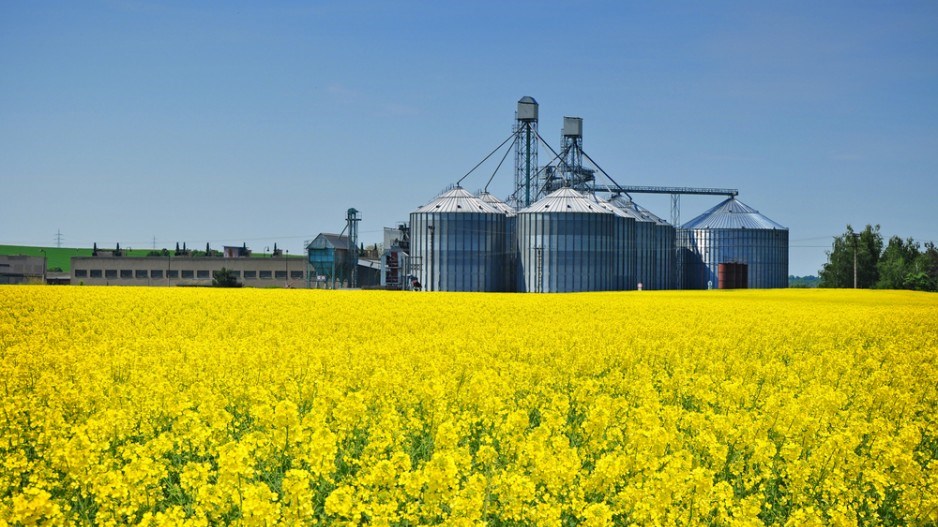The oil pipeline debate, driven by a need to get Canada’s resources to overseas markets, has generated much attention. But there’s another type of oil whose presence on the world stage is growing exponentially as the lucrative middle class in Asia-Pacific countries gains wealth and awareness of the health benefits of a made-in-Canada success story: canola.
Canada’s Prairie “golden child” generates $19.3 billion in economic activity every year. A truly sustainable product, canola oil is harvested by 43,000 growers throughout the Prairies and largely depends on access to export markets to generate revenue that flows back to Canadian farmers. It is symbiotic relationships with terminal facilities that make this happen; the wealth of canola flows from the Prairies west by train, to Port Metro Vancouver – the end of the canola “funnel” – where Vancouver’s West Coast Reduction plays a key role in the storage and throughput of nearly 65% of Canada’s canola oil exports to Asia-Pacific markets.
When Jack Diamond and his son Gordon, founders of West Coast Reduction, first started processing animal meat byproducts from the agri-foods sector as one of the original recyclers in 1964 – keeping scraps unwanted for human consumption out of landfills by creating tallow and high-protein feed ingredients – they would never have guessed that the company would, 50 years and four generations later, be connecting Canada’s agricultural products to global markets from China to Indonesia.
West Coast Reduction has grown to be the largest independent vegetable oil and animal fats terminal shipping facility on North America’s west coast. Every year, the family-owned company and its workers in B.C. and throughout Western Canada export more than 1.5 billion pounds of canola oil and more than 225 million pounds of animal fats or tallow – worth a combined total of nearly $1 billion.
Governments in Ottawa, Victoria and across Western Canada are working to meet national and provincial priorities by expanding trade to help grow the economy through projects like the federal government’s Asia-Pacific Gateway and Corridor Initiative and the provincial government’s Asia-Pacific Strategy.
Premier Christy Clark’s trade mission in India will help tap into international markets and ensure B.C. continues to have the most diverse group of trading partners of any province.
As we look ahead to the regional, provincial and national drivers of economic growth, Canada’s food oil sector will continue to be a key contributor. Canola volumes alone are poised to grow by 150 million tonnes in 2015 to 250 million tonnes by 2025. From seed to table, a homegrown product like canola involves farmers, processors, rail companies and terminal facilities – creating jobs and returning value at each stage of the supply chain.
The Canola Council of Canada’s ambitious 10-year plan to capitalize on the world’s growing demand for healthy oils must be supported at all levels of government to ensure a reliable transportation network from Saskatchewan to B.C., where a small number of strategically located terminal shipping facilities like West Coast Reduction play a vital role in the supply chain. The B.C. government’s 10-year transportation plan shows that it’s committed to ensuring the province has the trade infrastructure it needs to secure the opportunities of expanded international trade.
To support this growth, West Coast Reduction is investing in infrastructure to maximize efficiencies. It’s also working on partnerships to leverage assets across the Prairies and in Vancouver on the port to ensure Canada continues to capture opportunities to drive revenue back to all levels of agriculture.
Improvements this year to railcar unloading and ship transfer infrastructure were realized with support from the federal government’s Asia-Pacific Gateway fund, but continued investment in both the port, in terms of storage, and efficient upgrades to rail and freight movement from Saskatchewan to B.C. will be critical to ensure Canada’s canola oil reaches the right markets.
Having the necessary infrastructure in place at the right time will keep exports of canola oil on track and position Canada for a prosperous “golden” future.
Barry Glotman is CEO of West Coast Reduction Ltd. Patti Miller is president of the Canola Council of Canada.



